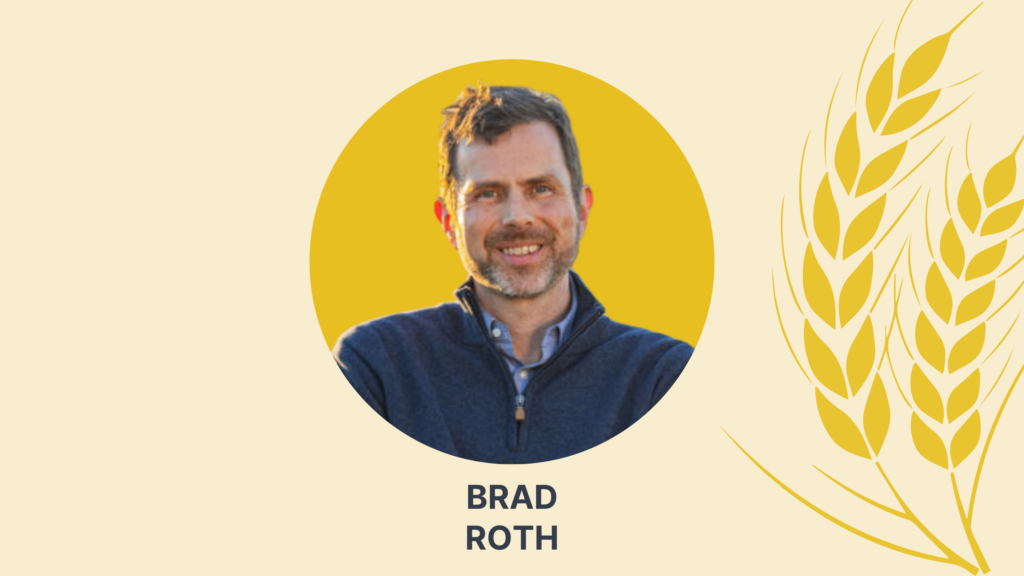Listen
Watch
Show Notes
The stories of news media and Hollywood often focus on major coastal cities. But God is at work everywhere and the small towns and rural communities of North America are a testimony to God’s goodness.
In this interview, Brad Roth, Mennonite pastor and award-winning author, shares about the importance of place, people watching and recognizing people for who God believes they can be.
Brad Roth serves as Lead Pastor of Whitestone Mennonite Church in Hesston, Kansas and is the author of the forthcoming book: Flyover Church: How Jesus’ Ministry in Rural Places Is Good News Everywhere (Herald Press, August 13, 2024). Brad grew up baling hay, tending sheep, and shearing Christmas trees on a farm in Illinois. Brad has a heart for serving God and God’s people in rural communities. His first book, God’s Country, won a Christianity Today Book Award of Merit. He’s passionate about sharing faith in word and deed and living out God’s love in the community. He and his wife enjoy bicycling, gardening, and hanging out with their three sons.
Help us spread the word about the Fresh Expressions podcast by subscribing and leaving us reviews on Apple Podcasts, Spotify, YouTube or wherever you enjoy your podcasts.
Related Resources:
A special thank you to Alabaster Grace Ministries for their music.
Join our Facebook group: Rural Renewal Podcast Community
Email us: podcasts@freshexpressions.com
Interview Summary
Might God be doing a new thing in rural places?”
This provocative question posed by Brad Roth sets the tone for a deeply insightful discussion on the revitalization of rural churches. Brad Roth, author of “God’s Country: Faith, Hope, and the Future of the Rural Church,” brings a unique perspective to the dialogue about the enduring value and evolving challenges of rural ministry. His background, growing up in rural Illinois and serving in rural communities, enriches his views, making this conversation not only relevant but also infused with personal passion and a profound understanding of rural ecclesiastical dynamics.
Pastoral Relationships and Community Building
Brad emphasizes the importance of building strong pastoral relationships as a cornerstone for thriving rural ministries. He shares personal stories of deep connections with other pastors, highlighting how these relationships have supported not only ministerial duties but also personal and familial growth.
Building strong pastoral relationships is not just beneficial, it’s essential for rural ministry.
Challenges and Opportunities in Rural Ministry
Rural ministries face unique challenges, including geographical isolation and smaller congregations, which can sometimes lead to feelings of discouragement and invisibility. However, Brad counters these challenges with the opportunities they present: tighter-knit communities and the potential for more profound personal relationships with congregants.
Every challenge in rural ministry is an opportunity in disguise.
The Role of Tradition and Innovation
Brad Roth offers a nuanced approach to the interplay between tradition and innovation in rural churches, emphasizing that both elements are crucial for the future of rural ministry. Tradition anchors communities, providing a sense of continuity and identity, while innovation introduces new practices and ideas that can adapt to changing circumstances and attract new generations.
Roth suggests that rural churches should respect their deep-rooted traditions, which often include family ties, community events, and established worship styles, while also being open to integrating new technologies, contemporary music, or alternative community outreach programs. This balance helps maintain the church’s relevance in a rapidly evolving world.
Ecumenical Approaches
Ecumenical relationships extend beyond mere cooperation among local churches; they involve deep partnerships that enrich theological understanding and broaden community impact. Roth highlights the importance of these relationships in strengthening the rural church’s role within the wider Christian community.
By collaborating on community projects like food banks, holiday events, or youth programs, different denominations can pool resources and expertise, leading to more significant impact and visibility in the community.
The future of rural churches lies in their ability to innovate while honoring tradition.
Brad Roth’s vision for rural churches is not just about maintaining the status quo but revitalizing and reimagining their role in modern society. He sees potential for growth and renewal, driven by a deep faith and commitment to the communities they serve. His insights encourage rural church leaders to see beyond the challenges of the present and to envision a future where rural churches continue to be vital centers of faith and community.
Reflection Questions
- How can rural churches better support the personal and spiritual growth of their leaders?
- What role can pastoral relationships play in strengthening rural ministries?
- How can rural churches balance tradition with innovation in their practices?
- What unique challenges do rural churches face today, and how can they address them?
- What lessons can urban and suburban churches learn from rural ministries?
- How can rural churches engage younger generations more effectively?

